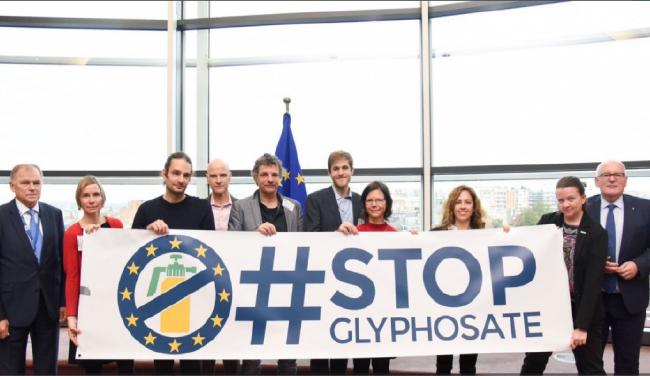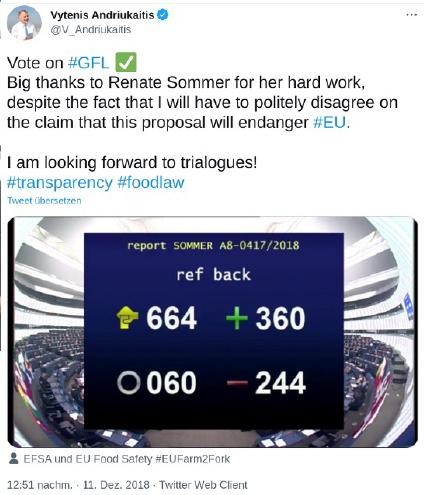
The citizens’ initiative which put an end to basing EU pesticide approval on secret industry studies
For a European Citizens’ Initiative (ECI) to be successful, it is not enough to collect a million signatures across Europe. It also takes a Commission willing to translate the demands of the hopefully successful ECI into a legislative proposal, and a Parliament and Council willing to adopt that legislative proposal without watering it down. How important it is for ECI organisers to actively follow through the entire legislative process that they had initiated, is shown by the example of the ECI "Stop Glyphosate" and its success in abolishing the use of secret industry studies to from EU approval procedures.
Picture - Organizers of the Stop Glyphosate ECI visiting the European Commission in September 2017. From left to right: Vytenis Andriukaitis (EC, Health Commissioner), Franziska Achterberg (Greenpeace), Martin Pigeon (Corporate Europe Observatory), Jorgo Riss (Greenpeace), Helmut Burtscher-Schaden (GLOBAL 2000 - FOE Austria), David Schwartz (WeMove) Angeliki Lyssimachou (Pesticide Action Network Europe) Mika Leandro (WeMove), Lisa Vickers (Avaaz), and Frans Timmermans (EC, Vice-President).
It has now been more than three years, but I remember it like it was yesterday. The day when the then EU Health Commissioner Vytenis Andriukaitis presented a legislative proposal to end the secrecy of industrial studies. This proposal was an official response to the ECI “Stop Glyphosate” which I had the honour to co-organise as a representative of GLOBAL 2000 - Friends of the Earth, Austria. With this ECI we had demanded a ban on the world's best-selling and highly controversial pesticide, the weed killer glyphosate. This was denied to us. However, our demand to ensure that the scientific evaluation of pesticides for EU authorisation is based only on published studies, resulted in this legislative proposal.
I was sitting in the train back to Vienna from an NGO meeting in Brussels and had just started to study the legislative text, when I was called by a German journalist and asked for my opinion about the proposal. Since I had only skimmed the text of the law and am also not a lawyer, my answer was a little cautious, but still quite positive. I said that if the automatic publication of all industry studies in all authorisation procedures actually came about (as announced by the Commission) then that would be nothing less than a small revolution.
That was in April 2018. In the meantime, this small revolution has actually taken place: Since 27 March 2021, no food-related products such as pesticides, additives, packaging materials or genetically modified organisms may be authorised throughout the EU on the basis of secret industry studies. This is a paradigm shift and has the potential to become a global game changer: For the first time in history, independent academic scientists are able to scrutinise those manufacturer studies that industry has used for decades to claim the safety of their products.
"And it feels really good to say to the more than one million Europeans who signed our ECI: your signature paid off".
With your support, we were able to bring about crucial legislative improvements in the EU. Improvements that will have a global impact. Because once a study is published in the EU, it is everywhere.
The three decisive success factors
Looking back, I count a total of three crucial elements that made this success possible: First, there was the continuing great interest of European citizens, media and NGOs in the issue of glyphosate. This interest was rooted in a rare public row between two international public health bodies, the European Food Safety Authority (EFSA) and the World Health Organisation’s International Agency for Research on Cancer (IARC).
"The bone of contention was the carcinogenicity of glyphosate".
The assembled cancer experts of the IARC unanimously concluded that the substance is a probable human carcinogen, while the EFSA did not place glyphosate in any cancer category (not even „suspected carcinogen“). According to EU pesticide legislation, the recognition of glyphosate as a probable carcinogen would have required a ban of the herbicide. This controversy, which remains unresolved to this day, gave our ECI the necessary tailwind to collect the one million signatures in less than five months.
A second reason for our success was that in the wake of this controversy, our call for transparency was recognised by a growing number of EU decision-makers as a sensible and ultimately necessary improvement to the existing legal framework. For what had cost the EU authorities so much trust was the fact that their carte blanche for glyphosate was based virtually exclusively on industry studies, that were kept secret, whereas the WHO's cancer classification had only relied on scientific studies that were published.
"The WHO's classification was thus transparent and open to scientific scrutiny. The EU's carte blanche was not".
The EU Commission was rather aware of this. As early as March 2016, Health Commissioner Andriukaitis had indicated at a press conference that he wanted to check whether the public interest in disclosing the studies did not outweigh the manufacturers' interest in keeping them secret. When it was clear that the answer was "yes", he initiated the legislative proposal and went to great lengths to promote it to the European Parliament, the Member States and the Austrian Presidency. The latter gave me, as the Austrian representative of the Stop Glyphosate ECI, the honour of a joint press conference with the Commissioner in Vienna. This enabled us to draw attention to the importance of this legislative initiative and the important role of the Austrian Council Presidency for its implementation already two months before the start of the Presidency itself.
"With this move for more transparency we are responding to the concerns of Europeans", said Health Commissioner Andriukaitis at a press conference in Vienna: "I hope that the law can be passed before the European elections in May 2019. This requires the support of the European Parliament and the Member States. Austria's EU Presidency can play a decisive role in this.“
The third (and in my opinion most important) factor was that we - meaning the NGOs that had organised the ECI - had the willingness, the resources and the necessary expertise to follow and accompany the law-making process.
Why was this so important? Shortly after its publication, the Commission's transparency proposal faced a strong headwind from big industry.
The industry's covert fight against transparency
While the industry could not emphasise enough in their public statements how important transparency was to them, behind the scenes they played a different game. International associations of pesticide manufacturers, the food industry and the chemical industry painted grim scenarios of competitive disadvantages for the European economy, with negative effects on growth and jobs. In position papers and letters to the Council Presidency the industry representatives demanded serious changes to the Commission‘s proposal. For example, the clearly defined and narrow criteria for confidentiality in the proposal should be extended, and - contrary to the Commission's intention - the manufacturer's studies should not be published at the beginning of each authorisation procedure but only at its end. Also, industry should not have to prove that disclosure of data by the authority would harm its business interests, but the burden of proof should lie with the authority.
It was obvious that these industry amendments, if successful, would turn the intention of the transparency legislation into its opposite. Nevertheless, they found decisive support from the rapporteur in the lead Environment Committee of the European Parliament, the German conservative MEP Renate Sommer. She took over practically all of the above-mentioned demands of the industry and integrated them into her Draft proposal. This was in the summer of 2018.
At this stage of the play, it was very welcome that the lawyers of Client Earth, an NGO specialised in environmental law, stepped in and offered support to us. In a detailed legal analysis, they highlighted those strengths of the Commission's proposal that should be preserved and at the same time identified a number of concrete possibilities for further improvement.
Stop Glyphosate unites again
For us, the organizers of the ECI, Client Earth's legal analysis was worth its weight in gold. It formed the basis for a joint position paper that we presented on behalf of Stop Glyphosate at a press conference in Brussels on 14 September, 2018. And it was to become our strongest tool to counter the industry's attempts to water down the transparency proposal in the months that followed. We did this in letters and also in talks with Members of the European Parliament, representatives of the Member States, the Austrian Council Presidency and the EU Commission.
The fact that we were able to convince with our arguments became visible in mid-October 2018, when the then already advanced state of negotiations of the Council became visible due to a leak.
"What we found in the leaked Council documents was better than everything that we would have dared to hope".
The Council had strengthened positive elements of the Commission's proposal, removed previous ambiguities and safeguarded existing rights of access to environmental information. The industry's amendments, however, which would have watered down the transparency proposal beyond recognition, were not reflected in the Council's position.
Thus, the chances of an early end to the secrecy of industry studies had significantly improved. Nevertheless, some serious stumbling blocks still had to be circumvented and obstacles removed during the coming month before Health Commissioner Andriukaitis in February 2019 could give an all clear on twitter that the „first ever citizens’ initiative gets an agreed legislation“. These obstacles again came from the conservative rapporteur in the European Parliament's Environment Committee, Renate Sommer. After it had become clear that neither the Commission nor the Council supported the industry's watering-down attempts, Renate Sommer tried to postpone the timetable for processing the proposal until the next legislative period. This would have made it uncertain whether a newly elected Parliament and a new Commission would even take up the transparency initiative again. And if they did, the industry would have had time until then to make its wishes known at the decisive points with the appropriate emphasis. It is quite conceivable that the political opinion-forming process would have taken a different direction in a second attempt.
Thus, on 15 October 2018, to the surprise of the EU Commission and the Council, Renate Sommer told the news portal POLITICO that all parliamentary groups had agreed that the transparency proposal should no longer be concluded in the current legislative period. She almost succeeded with this push. But at this stage, the importance of a fourth success factor became apparent: luck.
The necessary bit of luck
This bit of luck ensured that we were in the right place at the right time to recognise early on what was brewing. Contacting with the shadow rapporteurs of the other groups, we found that, contrary to what was claimed, not all of them agreed with a deviation from the timetable. Neither did the Commission nor the Council. As a result, many levers were set in motion. A tug-of-war ensued in Parliament, which seven days and even more group meetings later was to culminate in the news portal POLITICO headlining on 23 October that the Parliament‘s Environment Committee was doing a U-turn back to the original timetable.
Luck was also a decisive factor in several votes, where a watering down of the legislative text could often be defeated by a margin of only a few votes. After Renate Sommer's amendments also failed to win a majority in the first plenary vote on 11 December, she started a last attempt to „kill“ the regulation, which she described as "dangerous" for the EU. In an unusual move, she asked the plenary to reject the Commission's proposal in its entirety.
On 11 December 2018, rapporteur Renate Sommer appealed to the plenary to reject the transparency proposal as a whole. 244 MEPs – most of them from the European People's Party - subsequently followed her and voted against the bill, 60 others abstained, but the majority of 360 MEPs voted in favour of the transparency proposal. Renate Sommer then resigned.
Renate Sommer's resignation cleared the way for a constructive and intensive trialogue that began in early January 2019 and came to a successful conclusion in February.
Transparency - a prerequisite but no guarantee of trust
One of the EU Commission's main motives for ending the secrecy of industry studies had been a reinforcement of trust in the EU authorisation system and the institutions involved. And yes, it is true that transparency is a prerequisite for trust. But it is by no means a guarantee of it. Ultimately, it is the quality of what becomes visible through transparency that is decisive for trust. Applied to the authorisation procedure for pesticides, this will be on the one hand the scientific quality of the previously secret industry studies, and on the other hand the quality of the evaluation of these studies by the authorities.
The ongoing EU for the re-approval of glyphosate by the European Food Safety Authority (EFSA) and the European Chemical Agency (EChA) is the first procedure carried out in line with the new transparency rules. This is because the Glyphosate Renewal Group has disclosed its studies thereby enabling the scientific scrutiny by independent third party scientist. This has recently led to critical judgements regarding the scientific quality of industry‘s genotoxicity studies and the authority‘s accuracy in evaluating industry‘s rodent carcinogenicity studies (the independent evaluation of the latter had been made possible earlier by an ECJ ruling). How the authorities will deal with these critical judgements from independent scientists will determine whether or not the European Union will be able to restore citizens' trust in the EU institutions and the authorisation procedures. Glyphosate, which was the trigger for the EU's new transparency regime, will also become the litmus test for its functioning.
Contributors
Helmut Burtscher-SchadenHelmut Burtscher-Schaden is a biochemist and has been working on the effects of chemicals on the environment and health for almost two decades at the NGO Global 2000 (Friend of the Earth Austria). He is the author of various publications on the ongoing controversy surrounding the EU approval of glyphosate and its scientific background. This work earned him the election as "Communicator of the Year 2017", a prize awarded annually by the Public Relations Association Austria (PRVA). Burtscher-Schaden was one of the initiators of the European Citizens' Initiative (ECI) "Stop Glyphosate" as well as the still ongoing ECI "Save Bees and Farmers".
The opinions expressed on the ECI Forum reflect solely the point of view of their authors and can in no way be taken to reflect the position of the European Commission or of the European Union.





Leave a comment